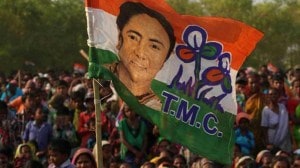- India
- International
Changing equations in region help Pakistan get relief at FATF meet
Sources said Pakistan had an important role in brokering a ceasefire deal with the Taliban in Afghanistan, negotiated this week at Doha with a US official team led by Zalmay Khalilzad, its special envoy on Afghan reconciliation.
 Pakistan Prime Minister Imran Khan. (Reuters File Photo: Denis Balibouse)
Pakistan Prime Minister Imran Khan. (Reuters File Photo: Denis Balibouse)
The changing geopolitical environment, including an imminent ceasefire deal with the Taliban in Afghanistan, has earned Pakistan diplomatic support from the United States and other western countries at a meeting of the Asia Pacific Joint Group of the Financial Action Task Force (FATF) in Beijing.
At the meeting Wednesday, Pakistan defended the country’s compliance report on combating terror-financing networks. Diplomatic sources present at the meeting told The Indian Express: “It was a bit surprising the way US, UK, France, Germany, Australia, New Zealand and even Japan, all of them favoured Pakistan. There is a strong case against Pakistan, as has been since it was put on the grey list, but it was geopolitics at play…seems the changing geopolitical environment helped Pakistan.”
Sources said Pakistan had an important role in brokering a ceasefire deal with the Taliban in Afghanistan, negotiated this week at Doha with a US official team led by Zalmay Khalilzad, its special envoy on Afghan reconciliation. It is believed that Pakistan may have also had a role to play in reducing tensions between Iran and the US earlier this month. Pakistan Prime Minister Imran Khan had a bilateral meeting with President Donald Trump in Davos this week.
At the January 21-23 meeting in Beijing, the Pakistani delegation was led by Hammad Azhar, its economic affairs minister. China, which is president of the FATF and co-chair for the Asia Pacific Joint Group, supported Pakistan at the meeting.
Chinese Foreign Ministry spokesman Geng Shuang told the media in Beijing: “Pakistan has made great efforts to strengthen its domestic counter-terrorism financing system with visible progress. Its political will and active efforts should be recognised and encouraged by the international community.”

Of the 27 actions it was supposed to undertake when it was put on the grey list in June 2018, Pakistan had been found fully compliant on five points at the last plenary meeting. Sources said it was expected, based on the actions taken by Pakistan, that “it could have reached a maximum of seven but it now seems that it will be deemed as compliant on 16 actions”.
Explained: What is the FATF, and why is Pakistan under its scanner?
“The reasons given by western countries in Beijing were that ‘Pakistan has shown progress, it has provided so much data, its facts are in place and so on’, which helped Pakistan in a big way,” sources said.
FATF’s upcoming plenary meeting is to be held next month in Paris where Pakistan is likely to make a case for its exclusion from the grey list. To achieve that, it needs 12 votes out of a total of 39 in Paris; it needs only three to avoid falling into the FATF blacklist. Sources believe that Pakistan is likely to be kept on the grey list in Paris but could be moved out in June or September.
Pakistan submitted a 650-page review report to the FATF on January 8. Submitted in response to 150 questions raised by the FATF in October 2019, it outlined steps taken by Pakistan until January 2020 to implement the Asia Pacific Group’s action plan, including against funds to groups like the Lashkar-e-Taiba, responsible for many terror attacks in India.
Apr 26: Latest News
- 01
- 02
- 03
- 04
- 05








































